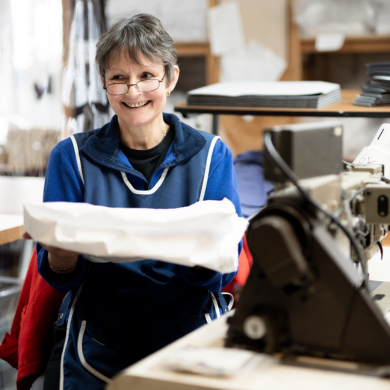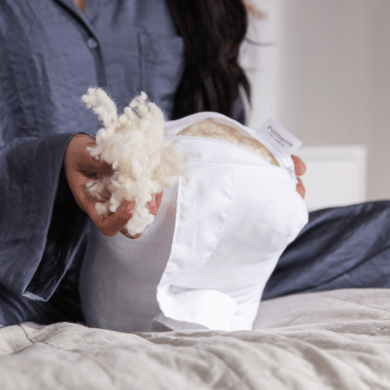
Die besten Betttipps für Ekzeme, Schuppenflechte und empfindliche Haut
Guter Schlaf ist wichtig für die Gesundheit. Bei Menschen mit Ekzemen, Schuppenflechte oder empfindlicher Haut kann die falsche Bettwäsche jedoch zu Unbehagen, Juckreiz und sogar zu Hautausschlägen führen. Die Auswahl der richtigen Materialien und Produkte ist mehr als nur eine Frage des Komforts. Es geht darum, eine beruhigende, reizfreie Umgebung zu schaffen, die erholsamen Schlaf und eine bessere Hautgesundheit fördert.
Hier erfahren Sie, was Sie über die Auswahl der besten Bettwäsche bei Ekzemen, Schuppenflechte und empfindlicher Haut wissen müssen.
Warum natürliche Materialien wichtig sind
Wenn es um Bettwäsche für Ekzeme und andere empfindliche Haut geht, ist die Verwendung natürlicher Materialien wie Baumwolle , Wolle und Bio-Buchweizenschalen ein entscheidender Vorteil. Diese Stoffe sind weich, atmungsaktiv und helfen, die Temperatur zu regulieren, wodurch Hautreizungen minimiert werden.
Im Gegensatz zu synthetischen Stoffen, die oft Wärme und Feuchtigkeit einschließen, sind natürliche Materialien sanft und lassen Ihre Haut atmen.
- Bio-Baumwolle : Hypoallergen, bei hohen Temperaturen waschbar und ideal für eine dauerhafte und langlebige Nutzung.
- Bio-Buchweizenschalen : Putnams verwendet 100 % Bio-Buchweizenschalen und Bezüge aus 100 % ungefärbter, ungebleichter Baumwolle, um unsere japanischen Buchweizenkissen so natürlich wie möglich zu halten. Hypoallergen, biologisch und umweltfreundlich – all das erfüllt sie.
- Wolle: Wolle ist von Natur aus atmungsaktiv und reguliert die Körpertemperatur. So wird Überhitzung, die Ekzemschübe auslösen kann, vermieden. Ihre feuchtigkeitsableitenden Eigenschaften halten die Haut trocken und minimieren Reizungen. Darüber hinaus ist Wolle von Natur aus resistent gegen Hausstaubmilben und somit eine ideale hypoallergene Option für empfindliche Haut.
Wenn Sie unter Hauterkrankungen wie Schuppenflechte leiden, können Sie Ihrer Haut durch die Wahl natürlicher Materialien eine dringend benötigte Pause von rauen, reizenden Stoffen gönnen.
Vermeiden Sie synthetische Stoffe wie Polyester, da diese Wärme und Feuchtigkeit speichern und so Juckreiz und Reizungen verschlimmern können. Achten Sie stattdessen auf Bettwäsche mit der Aufschrift hypoallergen , speziell entwickelt zum Schutz vor Allergenen wie Hausstaubmilben, Schimmel und Tierhaaren, die Schübe auslösen können.
Siehe auch - Tipps zur Linderung nächtlicher Allergien im Schlaf
Die Rolle hypoallergener Bettwäsche und hautfreundlicher Kissen
Verwenden hypoallergene Bettwäsche und hautfreundliche Kissen verbessert nicht nur Ihren Schlaf, sondern auch die Gesundheit Ihrer Haut. Diese Produkte sind darauf ausgelegt, Allergene wie Hausstaubmilben, Schimmel und Bakterien abzuwehren, die häufige Auslöser von Ekzemen und Schuppenflechte sind.
Vorteile hypoallergener Bettwäsche
- Resistenz gegen Hausstaubmilben – Dicht gewebte Materialien wirken als Barriere.
- Temperaturregulierung – Hält Sie kühl und reduziert überhitzte Haut.
- Sanft zur Haut – Frei von Reizstoffen wie aggressiven Farbstoffen oder synthetischen Materialien.
Beste Kissenauswahl
- Latexkissen : Von Natur aus resistent gegen Allergene, bieten die richtige Unterstützung und reduzieren gleichzeitig den Druck auf Ihre Haut.
- Memory Foam mit antiallergischem Bezug : Bietet Komfort und Schutz vor Auslösern.
- Buchweizenschalenkissen – Buchweizenschalenkissen sind ideal bei Ekzemen, Schuppenflechte und empfindlicher Haut. Ihre natürliche Atmungsaktivität verhindert Überhitzung und reduziert Reizungen. Die anpassbare Füllung bietet individuelle Unterstützung und fördert gleichzeitig die Luftzirkulation für einen kühleren Schlaf. Darüber hinaus sind die Kissen hypoallergen und frei von synthetischen Materialien, wodurch sie sanft zu empfindlicher Haut sind.
Für diejenigen, die den ultimativen Komfort suchen, umfassen die Produkte von Putnams Naturlatexkissen und Bettwäsche-Sets aus Bio-Baumwolle, die alles bieten, was Sie zur Pflege empfindlicher Haut benötigen.
Siehe auch - Graphit-Latex-Kissen: 4 Dinge, die Sie wissen sollten
Einfache Pflegetipps zur Vermeidung von Allergenen
Die Sauberkeit Ihrer Bettwäsche ist ebenso wichtig wie die Wahl der richtigen Materialien. Hier sind einige wichtige Tipps für eine gesunde Schlafumgebung:
- Bettwäsche regelmäßig waschen: Obwohl jeder seine eigenen Waschzyklen hat, wird empfohlen, das folgende Schema so genau wie möglich einzuhalten. Häufigkeit : Waschen Sie die Bettwäsche mindestens einmal pro Woche. Temperatur : Verwenden Sie heißes Wasser (60 °C), um Hausstaubmilben und Bakterien wirksam zu beseitigen.
- Waschmittel : Entscheiden Sie sich für parfümfreie, hypoallergene Waschmittel, um chemische Reizstoffe zu vermeiden. Wählen Sie ein mildes Waschmittel. Verwenden Sie parfümfreie, hypoallergene Waschmittel ohne aggressive Chemikalien. Herkömmliche Waschmittel mit starken Düften können empfindliche Haut reizen oder Erkrankungen wie Ekzeme auslösen.
- Verwenden Sie Schutzhüllen: Erwägen Sie die Anbringung staubdichter Bezüge mit Reißverschluss für Ihre Matratze und Kissen. Diese schützen vor Hausstaubmilben und Allergenen, verlängern die Lebensdauer Ihrer Bettwäsche und halten Ihre Haut vor Reizstoffen geschützt.
- Einstreu gründlich trocknen: Lassen Sie Ihre Bettwäsche nach dem Waschen nicht feucht, da dies die Bildung von Schimmel begünstigen kann. Trocknen Sie Ihre Bettwäsche an der Luft oder im Wäschetrockner bei niedriger Temperatur.
- Alte Bettwäsche ersetzen: Mit der Zeit sammeln sich Bakterien und Allergene in Ihren Kissen und Bettdecken an. Ersetzen Sie diese Artikel je nach Zustand und Qualität alle 1–2 Jahre .
Beste Bettwaren für empfindliche Haut von Putnams
Wenn Sie nach Bettwaren suchen, bei denen Gesundheit und Komfort im Vordergrund stehen, Putnams bietet eine hervorragende Auswahl an hautfreundlichen Lösungen. Die Marke ist bekannt für ihre Produkte zur Unterstützung empfindlicher Haut und bietet Optionen zur Verbesserung der Schlafqualität sowie zur Reduzierung potenzieller Auslöser von Ekzemen und Schuppenflechte. Hier sind einige herausragende Optionen:
-
Putnams Naturlatexkissen
Diese Kissen bestehen aus hypoallergenem, milbenresistentem Naturlatex. Ihr atmungsaktives Design sorgt für eine kühle Temperatur und reduziert so Schwitzen und Reizungen während der Nacht. Darüber hinaus bieten sie festen und dennoch sanften Halt für einen erholsamen Schlaf.
-
Bettwäsche-Sets aus Bio-Baumwolle
Die Bettwäsche-Sets von Putnams bestehen aus 100 % Bio-Baumwolle und sind weich, atmungsaktiv und frei von Chemikalien. Sie sind daher ideal für alle, die Bettwäsche für Ekzeme oder Schuppenflechte. Diese Sets sind außerdem langlebig und leicht zu waschen, sodass sie Nacht für Nacht Komfort und Sauberkeit gewährleisten. -
Memory Foam-Matratzenauflagen mit antiallergischem Bezug
Werten Sie Ihre vorhandene Matratze mit den antiallergischen Matratzenauflagen von Putnams auf. Diese Auflagen reduzieren Druckstellen, während die schützenden Bezüge vor Allergenen schützen und so für eine bessere Hautgesundheit im Schlaf sorgen. -
Verstellbare Bettkeile für bessere Schlafpositionen
Für Personen, die eine erhöhte Schlafposition vorteilhafter finden (z. B. um den Hautkontakt mit bestimmten Bereichen zu reduzieren), bieten die Bettkeile von Putnams eine wirksame Lösung. - Britische Wolle – Wollbettwäsche ist ideal für empfindliche Haut, da sie die Temperatur auf natürliche Weise reguliert und Überhitzung verhindert, die Hautreizungen wie Ekzeme oder Schuppenflechte verursachen kann. Ihre hypoallergenen Eigenschaften wirken Hausstaubmilben und Schimmel entgegen und reduzieren so häufige Allergene. Die weiche, chemiefreie Wolle sorgt zudem für ein sanftes und beruhigendes Schlafklima.
Siehe auch – Wolle ist gut für die Haut
Häufige Fragen zu Bettwäsche für empfindliche Haut
-
Q: Was macht Bettwaren „hypoallergen“?
A: Hypoallergene Bettwäsche minimiert Allergene wie Hausstaubmilben und Schimmel. Materialien wie dicht gewebte Baumwolle und Naturfasern wie Wolle sind in hypoallergenen Produkten weit verbreitet, da sie Bakterien und Allergene hemmen. -
Q: Wie wähle ich das beste Kissen für Ekzeme aus?
A: Suchen Sie nach Kissen mit natürlichen, atmungsaktiven Bezügen wie Bio-Baumwolle oder Latex. Vermeiden Sie mit synthetischen Chemikalien behandelte Kissen und wählen Sie hypoallergene Optionen, um allergischen Reaktionen vorzubeugen.
Durch die Wahl natürlicher, hautfreundlicher Materialien und eine konsequente Reinigungsroutine können Sie Ihr Schlafzimmer in eine Oase für erholsamen Schlaf verwandeln.
Ob es sich um Investitionen in hypoallergene Bettwäsche , Hautfreundliche Kissen oder Bio-Bettwäsche wie die Produkte von Putnams – kleine Veränderungen Ihrer Schlafgewohnheiten können zu deutlichen Verbesserungen Ihres Komforts und Ihrer Hautgesundheit führen. Süße Träume erwarten Sie!
















Hinterlassen Sie einen Kommentar